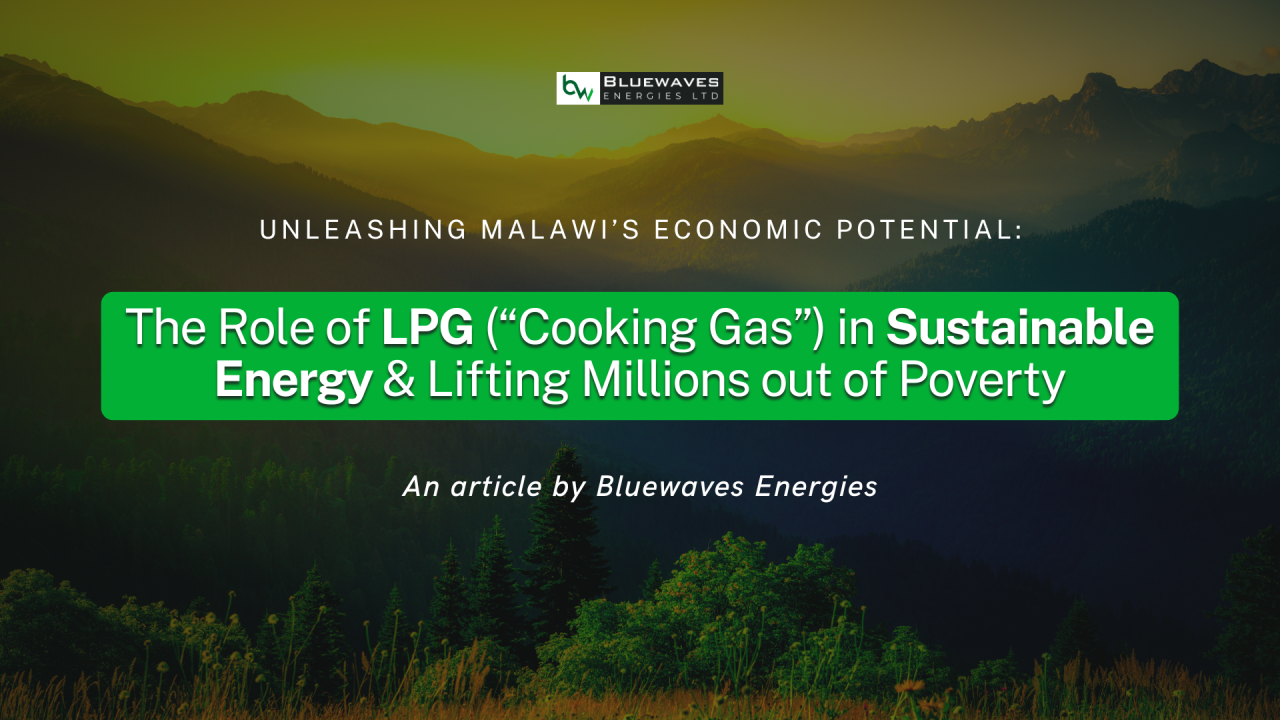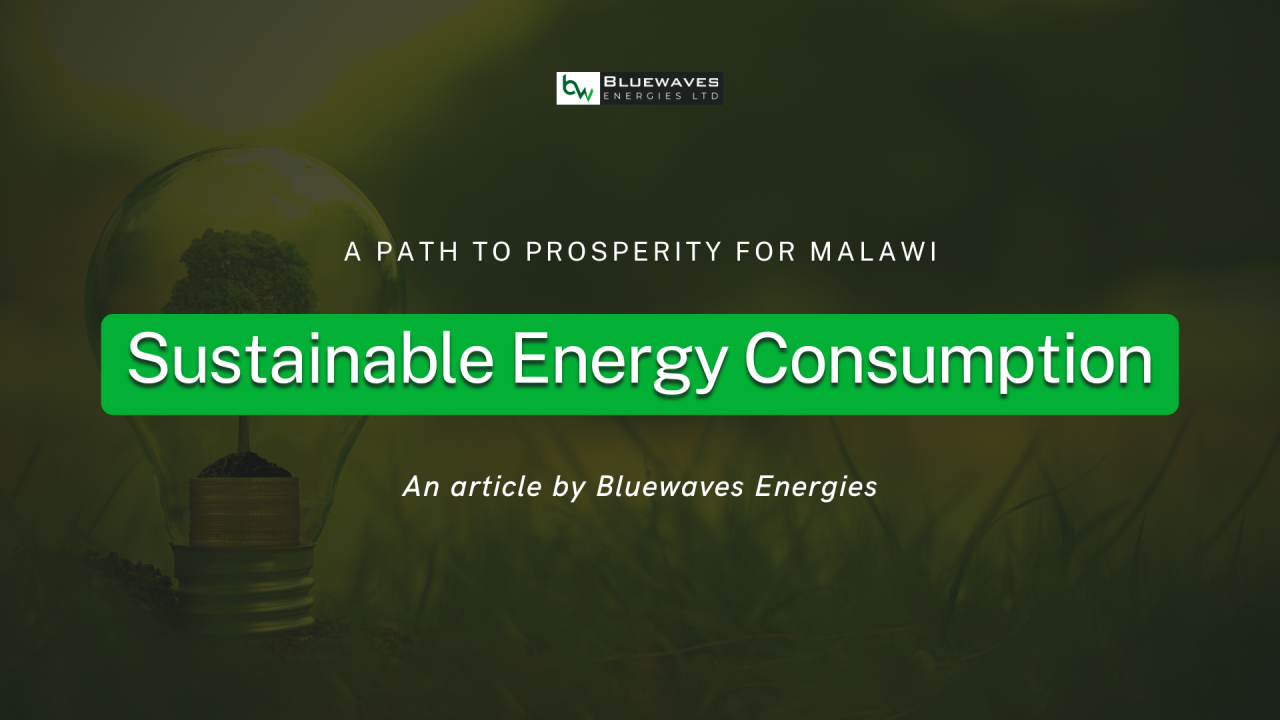Malawi is at a pivotal moment in its energy journey. The country's energy sector has long been dominated by biomass and hydroelectric power, leaving it vulnerable to deforestation and fluctuating water levels. In light of this, a transition to Liquefied Petroleum Gas (LPG) and other renewable energy sources could be instrumental in fueling economic growth while ensuring sustainability.
LPG: A Critical Component of Malawi's Energy Mix
LPG stands out as an immediate solution to the energy challenges facing Malawi. Traditional biomass use, which accounts for over 80% of the country's energy consumption, is not sustainable due to its environmental impact and inefficient combustion, which contributes to significant indoor air pollution. By switching to LPG for cooking and other energy needs, Malawi can mitigate deforestation, reduce emissions, and promote cleaner air quality.
The Malawi Integrated Energy Plan highlights LPG as a critical player in achieving SDG 7—affordable and clean energy—by providing clean cooking solutions. This shift is crucial, given that less than 1% of the population currently has access to clean cooking technologies, and over 85% still rely on harmful biomass energy
(UNDP, Sustainable Energy for All | SEforALL).
Countries like Ghana and Kenya have demonstrated the transformative impact of LPG adoption. Ghana, for example, initiated a comprehensive LPG policy that has resulted in significant reductions in deforestation and improved health outcomes through reduced exposure to toxic smoke. Kenya has similarly expanded LPG access to rural communities, resulting in better health and increased time for economic activities.
(World Bank Open Knowledge, UNDP).
Economic Benefits of LPG Adoption
LPG is a gateway to economic growth in several ways:
- Job Creation: The development of LPG infrastructure, including distribution, storage, and retail, can create jobs at every stage of the supply chain. Malawi's growing LPG sector is expected to spur employment in both rural and urban areas, reducing poverty and driving economic growth (Standard Bank).
- Business Development: LPG enables small businesses to thrive by providing reliable and efficient energy. From street vendors to larger-scale food production enterprises, LPG reduces the cost of energy, making it possible for businesses to operate more sustainably and profitably. (UNDP).
- Boosting Rural Electrification: Malawi's low electrification rates, particularly in rural areas, can benefit from LPG as a supplement to unreliable grid power. Communities can access cleaner energy without waiting for the expansion of the national grid, which remains costly and slow (Sustainable Energy for All | SEforALL).
Scaling Up LPG Adoption: The Role of the Private Sector
In Malawi, private sector entities such as Bluewaves Energies, 265 Energy, and Sky Energy Africa are critical players in expanding access to LPG and other renewable energy solutions. These companies are working tirelessly to bring LPG infrastructure to rural and urban populations, thereby helping to diversify Malawi's energy portfolio and alleviate pressure on the country’s biomass resources. By integrating LPG into their service offerings, these businesses are playing a direct role in addressing the energy challenges that have historically held back economic development.
Bluewaves Energies is committed to providing a range of energy solutions, including clean and affordable options that align with Malawi's development objectives. Our business model is built around delivering accessible energy that meets the needs of both small-scale and large-scale users. Our continued investment in LPG infrastructure, including storage facilities, distribution networks, and retail outlets, demonstrates the scalability of LPG in both urban and rural settings. Our company’s strong engagement in awareness and education campaigns (both online and in-person) is also important for educating the population about the economic and health benefits of transitioning from traditional biomass to LPG.
A Comparative Look: The Success of LPG in Other African Economies
Malawi can learn from the success stories of other African nations where LPG adoption has been transformative. In Ghana, for example, the government’s LPG promotion policy aimed to make LPG the primary cooking fuel across the country. This program involved subsidies on LPG appliances and a robust distribution network, ensuring widespread access. As a result, the reliance on traditional biomass has dropped significantly, with deforestation rates decreasing and public health improving due to reduced indoor pollution.
Similarly, Kenya has seen success with its “Clean Cooking Alliance,” which has brought together private companies, non-governmental organizations, and the government to drive LPG adoption in rural areas. This multi-stakeholder collaboration has led to the creation of new jobs, expanded the energy market, and increased energy security, thereby contributing to economic growth.
These success stories underscore the immense potential of LPG as a cleaner, more efficient energy source, and they provide a blueprint for Malawi to follow. If similar strategies are applied, including the expansion of distribution networks and the introduction of subsidies, Malawi could accelerate its transition to a low-carbon economy, contributing to its long-term sustainability goals.
The Role of Government and Policy
The government of Malawi plays an indispensable role in creating an enabling environment for LPG adoption. By aligning its national energy policies with global frameworks such as the Sustainable Development Goals (SDGs), specifically SDG 7, the government can fast-track initiatives to provide clean, affordable energy to its people. The Malawi Integrated Energy Plan already highlights LPG as a critical tool for achieving clean cooking solutions, but more needs to be done to scale up access to LPG infrastructure, particularly in rural areas.
Government policies that promote public-private partnerships (PPPs) can be instrumental in facilitating LPG market growth. Such partnerships could involve subsidies for LPG appliances, tax incentives for companies that invest in LPG infrastructure, and funding for training programs that build local capacity to manage LPG systems. Additionally, regional collaborations with neighboring countries could lower the costs associated with importing and distributing LPG in Malawi.
In terms of financing, Standard Bank Malawi has emerged as a key player, offering renewable energy loans aimed at businesses and individuals who wish to invest in LPG and other green technologies. Their Sustainable Impact Framework is designed to ensure that economic growth is achieved while maintaining environmental sustainability, aligning closely with national and global energy goals. The availability of financial products that support LPG adoption is critical for scaling up its use across the country(Standard Bank, Standard Bank).
Unlocking the People's Potential
A shift toward LPG is not just an energy issue; it’s a people-centric transformation. The health benefits alone are substantial, as indoor air pollution from biomass burning contributes to respiratory diseases, disproportionately affecting women and children. By making clean cooking technologies like LPG more accessible, Malawi can significantly improve public health outcomes, free up time for women to engage in income-generating activities, and enhance overall quality of life.
Moreover, the job creation potential in the LPG value chain—spanning from distribution, maintenance, and retail—cannot be overstated. As more people become employed in these sectors, poverty levels can decrease, and economic resilience can grow. The private sector, particularly small- and medium-sized enterprises (SMEs), can benefit enormously from the more reliable and efficient energy that LPG provides. SMEs, which contribute approximately 40% of Malawi's GDP, are crucial drivers of economic growth and can use LPG to reduce operational costs, improve productivity, and expand their market reach.
A Sustainable Future: LPG and Beyond
While LPG presents an immediate solution to Malawi's pressing energy needs, the long-term goal should be to integrate LPG within a broader sustainable energy ecosystem. This ecosystem could include solar energy, biogas, and other renewable technologies. Given the country's heavy reliance on agriculture, bioenergy solutions also have great potential, particularly in rural areas.
International organizations such as Sustainable Energy for All (SEforALL) and development partners like the United Nations Development Programme (UNDP) are already working closely with the Malawian government to implement comprehensive energy plans. These plans include expanding access to clean cooking technologies and promoting the integration of renewables into the national energy grid. By incorporating both LPG and renewable energy sources, Malawi can achieve a more diversified energy portfolio that drives sustainable economic growth while reducing its carbon footprint (Sustainable Energy for All | SEforALL, UNDP).
In conclusion, by making deliberate efforts to finance, support, and scale up LPG infrastructure and adoption, Malawi can pave the way for long-term, sustainable economic growth. As the country shifts towards cleaner and more efficient energy solutions, the reduction in deforestation, improvement in public health, and the creation of new jobs in the energy sector will empower communities and drive national development. However, this will require coordinated efforts from the government, private sector, and international organizations to ensure that the transition to LPG is both equitable and far-reaching.
The role of innovative financial solutions, such as Standard Bank’s renewable energy loans (Standard Bank), is pivotal in driving investments into clean energy projects. Similarly, partnerships with companies like Bluewaves Energies, 265 Energy, and Sky Energy Africa can accelerate the availability of LPG throughout the country, ensuring that even the most remote regions are not left behind in the energy transition(Standard Bank).
By leveraging these resources and models from other successful African nations, Malawi can significantly reduce its dependency on biomass, achieve its SDG 7 targets, and lead the way toward a more sustainable future. Ultimately, this energy transformation will be instrumental in unlocking Malawi’s full economic potential, providing its citizens with better opportunities, healthier living conditions, and a cleaner environment for future generations.



